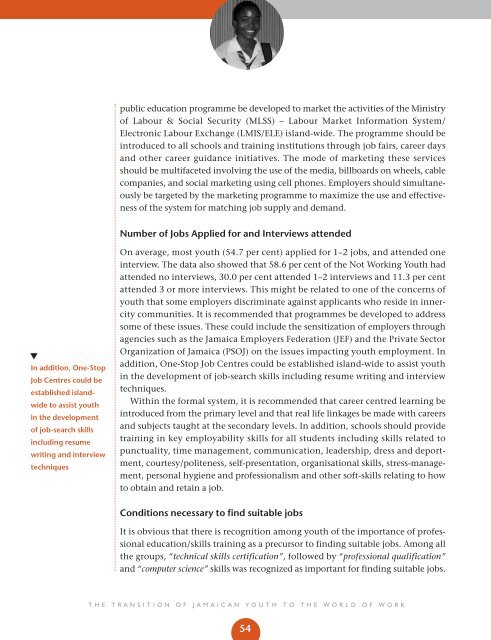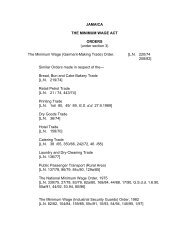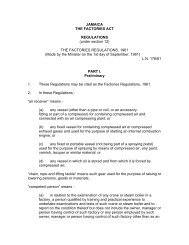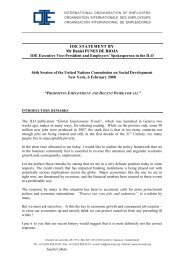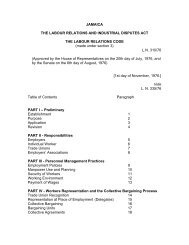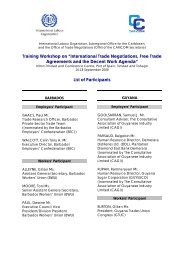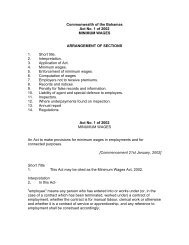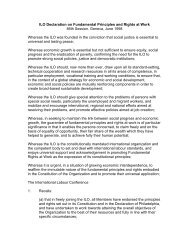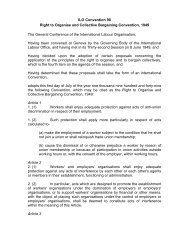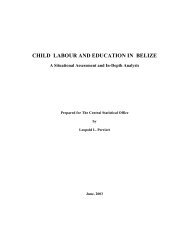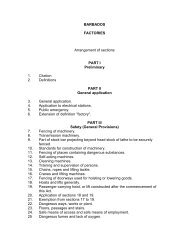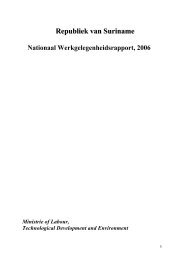The Transition of Jamaican - International Labour Organisation ...
The Transition of Jamaican - International Labour Organisation ...
The Transition of Jamaican - International Labour Organisation ...
Create successful ePaper yourself
Turn your PDF publications into a flip-book with our unique Google optimized e-Paper software.
public education programme be developed to market the activities <strong>of</strong> the Ministry<br />
<strong>of</strong> <strong>Labour</strong> & Social Security (MLSS) – <strong>Labour</strong> Market Information System/<br />
Electronic <strong>Labour</strong> Exchange (LMIS/ELE) island-wide. <strong>The</strong> programme should be<br />
introduced to all schools and training institutions through job fairs, career days<br />
and other career guidance initiatives. <strong>The</strong> mode <strong>of</strong> marketing these services<br />
should be multifaceted involving the use <strong>of</strong> the media, billboards on wheels, cable<br />
companies, and social marketing using cell phones. Employers should simultaneously<br />
be targeted by the marketing programme to maximize the use and effectiveness<br />
<strong>of</strong> the system for matching job supply and demand.<br />
Number <strong>of</strong> Jobs Applied for and Interviews attended<br />
<br />
In addition, One-Stop<br />
Job Centres could be<br />
established islandwide<br />
to assist youth<br />
in the development<br />
<strong>of</strong> job-search skills<br />
including resume<br />
writing and interview<br />
techniques<br />
On average, most youth (54.7 per cent) applied for 1–2 jobs, and attended one<br />
interview. <strong>The</strong> data also showed that 58.6 per cent <strong>of</strong> the Not Working Youth had<br />
attended no interviews, 30.0 per cent attended 1–2 interviews and 11.3 per cent<br />
attended 3 or more interviews. This might be related to one <strong>of</strong> the concerns <strong>of</strong><br />
youth that some employers discriminate against applicants who reside in innercity<br />
communities. It is recommended that programmes be developed to address<br />
some <strong>of</strong> these issues. <strong>The</strong>se could include the sensitization <strong>of</strong> employers through<br />
agencies such as the Jamaica Employers Federation (JEF) and the Private Sector<br />
Organization <strong>of</strong> Jamaica (PSOJ) on the issues impacting youth employment. In<br />
addition, One-Stop Job Centres could be established island-wide to assist youth<br />
in the development <strong>of</strong> job-search skills including resume writing and interview<br />
techniques.<br />
Within the formal system, it is recommended that career centred learning be<br />
introduced from the primary level and that real life linkages be made with careers<br />
and subjects taught at the secondary levels. In addition, schools should provide<br />
training in key employability skills for all students including skills related to<br />
punctuality, time management, communication, leadership, dress and deportment,<br />
courtesy/politeness, self-presentation, organisational skills, stress-management,<br />
personal hygiene and pr<strong>of</strong>essionalism and other s<strong>of</strong>t-skills relating to how<br />
to obtain and retain a job.<br />
Conditions necessary to find suitable jobs<br />
It is obvious that there is recognition among youth <strong>of</strong> the importance <strong>of</strong> pr<strong>of</strong>essional<br />
education/skills training as a precursor to finding suitable jobs. Among all<br />
the groups, “technical skills certification”, followed by “pr<strong>of</strong>essional qualification”<br />
and “computer science” skills was recognized as important for finding suitable jobs.<br />
THE TRANSITION OF JAMAICAN YOUTH TO THE WORLD OF WORK<br />
54


